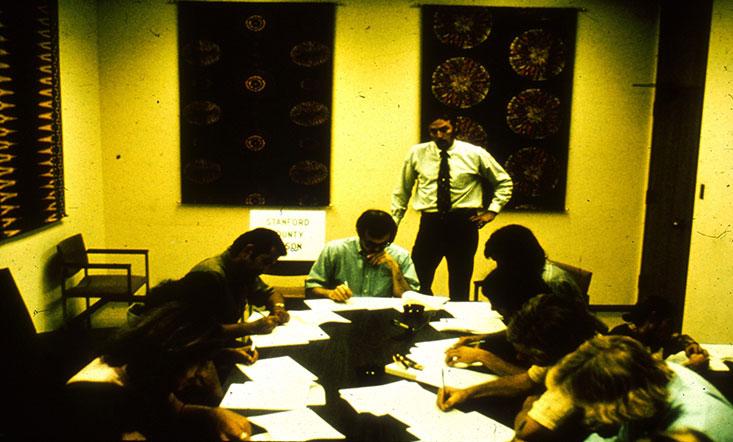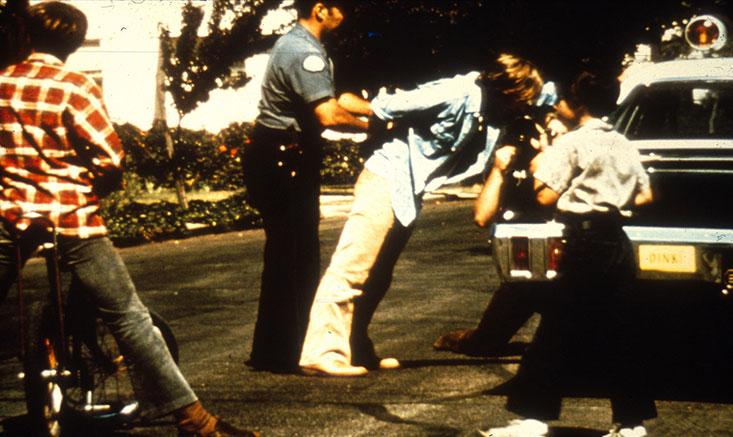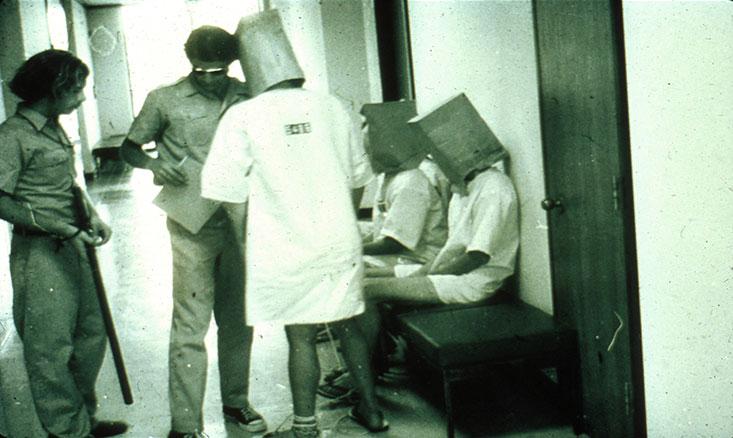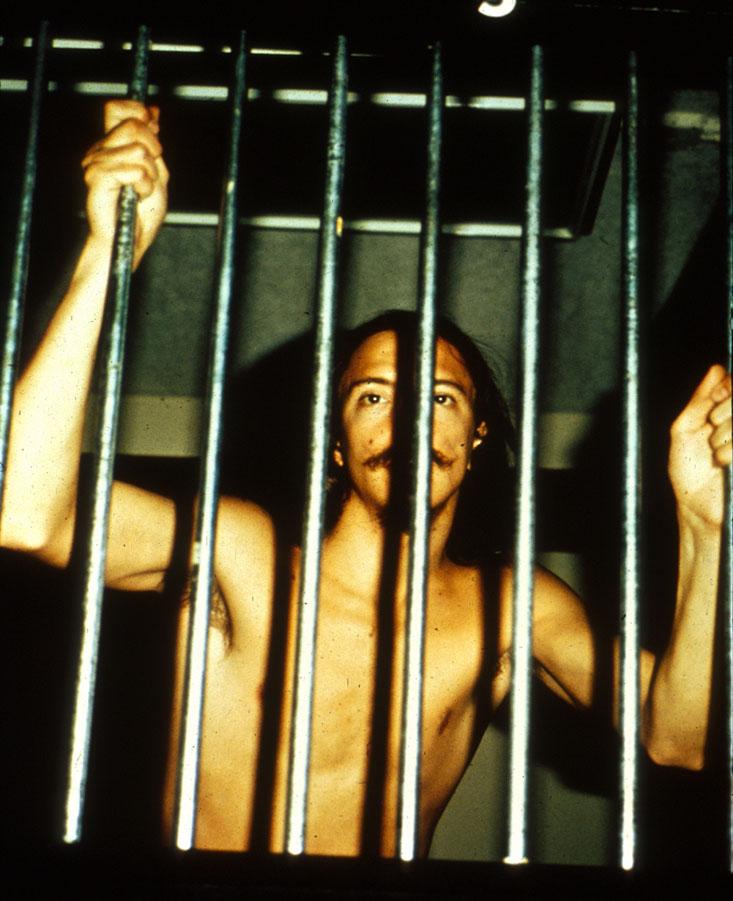Man indulged with absolute power
 In his report on TED in 2008, Philip Zimbardo showed Escher’s “Limit - Circle IV”, a mosaic made up of angels and demons, to demonstrate the essence of his speech. Zimbardo explained that this image reminds us of how "good and evil, like yin and yang, are combined in man." These two qualities appear fairly quickly.
In his report on TED in 2008, Philip Zimbardo showed Escher’s “Limit - Circle IV”, a mosaic made up of angels and demons, to demonstrate the essence of his speech. Zimbardo explained that this image reminds us of how "good and evil, like yin and yang, are combined in man." These two qualities appear fairly quickly.Zimbardo became famous in 1971, conducting a Stanford prison experiment , where students played the role of guards and prisoners. The experiment was designed for two weeks, but it ended after six days, as the guards began to mock the prisoners, and some of the latter had a nervous breakdown.
Zimbardo himself played a key role. “In this experiment, I had absolute power,” Zimbardo tells me. “It was I who finally intervened and stopped him, but I could do it, and should have done it before.” The temptation of power can change the personality, he says - and, no doubt, it was this thought that helped him stand in court in defense of Ivan “Chip” Frederick, a sergeant of the US army reserve, accused of being tortured in Abu Ghraib prison .

Philip Zimbardo
')
Over the years that have passed since the experiment, Zimbardo became increasingly interested in positive psychology, and founded a non-profit organization promoting everyday heroism and kindness. In December, he gave an interview to Nautilus .

Instructions from the Stanford Experiment
What caused your interest in power?
It comes from my childhood when I grew up in the ghetto in the South Bronx. One of the basic aspects of poverty is the absence of any authority. If you are rich, you have the power of money; you have social connections, the power of people. If you are poor, you have neither. I have always been interested in this question. For me, education has become a form of power.
How do you define power?
Power is a force that influences events, good and bad. It can be internal, as compassion, or external, as status or wealth. The power is in the center of my idea of evil - that people harm, hurt and kill other people in different ways. In the study of prison power is the main topic, since the guards need to convince prisoners that they have almost complete power over the life of prisoners.
What prompted you to develop a Stanford prison experiment?
The Stanford Prison Experiment was designed to describe situational power. To be a prison guard is to demonstrate to prisoners that you have all kinds of power over them, and they have practically no power. I also wanted to organize a situation similar to real life, going on 24 hours a day, day after day, directly watching the changes of personalities, while people got used to their roles and became them.

Start: a prisoner is arrested during a prison experiment
How did you make sure that the students you recruited were not originally bad guys?
75 students responded to an ad in the Palo Alto newspaper. We provided them with a set of personality tests and then randomly selected two dozen of the most psychologically stable, so that they could play the roles of a prisoner or a guard. The remaining features are equally distributed among the people who played these roles.
Did the subjects try to resist their roles as prisoners and guards?
Tried We brought everything closer to reality: hearings at the parole council, visits of parents. But in 1971, students were activists and did not like war. Many students protested against the war, and the local police beat or mocked them. Therefore, at first, no one wanted to be a prison guard. Initially, the guys playing the role of guards, it was very difficult to enter into it. But on the second day, the prisoners staged a riot. They did not want inhuman treatment of them, because one of the ways to take power from you is to take your name, your style, hairstyle, etc.
How did the guards react to the riot?
All 12 guards gathered and put down a riot. At that moment they said: “These are dangerous criminals. They need to show who is in charge here. ” It changed everything. It was then that turned into a prison. No one has used the word "experiment." The guards used physical force - they stripped the prisoners naked, chained them, locked them in solitary confinement. There were fights. The guards used psychological pressure to make prisoners feel helpless and desperate. It was then that I needed to intervene, but I did not.

Awaiting Parole Releases
Is the situation in Abu Ghraib a Stanford experiment?
Abu Ghraib was a Stanford steroid experiment. The guards worked for 12-14 hours a shift and did not leave the prison. Abu Ghraib was constantly bombed, so the guards lived in the cells. So, they were completely embroiled in the situation. Many prisoners were not dressed, because there were not enough uniforms for everyone. Many were dirty because they lacked showers. No one spoke English. Iraqi police smuggled in drugs and helped prisoners escape; the prison was bombed. In such a situation, the work of the guard turns into a nightmare.
In addition, they had 12 hours of free time every night. And they started using prisoners as toys to brighten up boredom. The prisoners were naked, or they stripped them, and then it was even worse. Each guard was doing something humiliating, and the harassment lasted three months. When you have the power, you use the boredom you want. Lindy England, one of the female guard, said: "We had fun and played." They did not think they were doing something wrong.
What role did the security guards play in Abu Ghraib?
The head of the military intelligence said to the head of the military police: “We want the guards not to stand on ceremony at night. We want them to do everything necessary so that the prisoners tell everything. ”
There was no ill-treatment on the day shift - 100% of the abuses occurred on night duty. Historically, this is the clearest situational variable [in psychology - a characteristic of a situation or environment that can affect communication - approx. trans.]. It never happened that a senior officer went down to the basement and looked at what was going on there. The security was given unlimited power without any supervision. Power without limits - a guarantee of evil and disaster.
Does anonymity fuel inappropriate behavior?
In the 1950s, at New York University, I conducted research in which female students put on hoods, which made them feel anonymous. If they were given the opportunity to shock other women, on average they did twice as many painful electric shocks than women who did not have anonymity. A person's sense of anonymity and the inability to isolate him from the crowd are key factors for the emergence of a sense of power.
Is there real anonymity?
In the Internet. There you can meet cyber hooligans, people pretending to be someone else. There is evidence that Russian hackers influenced the election of the American president by spreading lies about Hillary Clinton and influencing the election to the Democratic Congress. Many believed in the Internet reality, took the Internet as a revelation. The internet has tremendous power that can be used for good or evil. In the case of the election of Trump, we see how this power was used for evil.

Undressed participant in the Stanford solitary confinement experiment
Why do people behave differently in different social conditions?
Certain physical conditions have their own set of functioning rules. When you find yourself in such a situation, it dictates: “These are the rules. That's what you need to do, and if you want to play this game, you have to do just that in this situation. ” There is no evidence that any terrors occurred in Abu Ghraib during the 12 day hours. Everything becomes very specific, concentrated, localized. You enter the classroom, the prison, the company headquarters, and then the physical environment determines your behavior and sets the framework for what you do there and then. And in many cases only there and then. You leave from there, go home. You sell mortgages or loans under terrible conditions - we have seen cases of economic collapse, and what people did in such an environment, and then you can go to church, be a good father and a good husband.
What is the goal of the “Heroic Imagination Project”?
We can recreate situations in such a way that they provoke compassion, care, kindness and heroic deeds, using the same psychological principles, only altering everything for the appearance of good, and not evil. For example, we teach people that from a passive witness you can turn into an active, intelligent, effective hero. Instead of limited thinking, you get dynamically growing. The team and I have developed a set of training lessons based on social psychology and the power of the situation, only now in each lesson we are teaching situational attention.
If you could redo the Stanford experiment, what would you do differently?
I would assign myself a boss. I would have an ombudsman able to interrupt the process. The study would end after the second case of a nervous breakdown. I would also have the guards trained in positive psychology and compassion. Would it turn out that training guards in positive thinking is enough to reverse the negative situation?
From the translator: based on the experiment in 2001, the film The Experiment was shot.
Source: https://habr.com/ru/post/401977/
All Articles